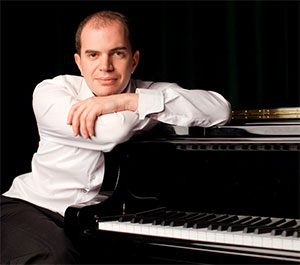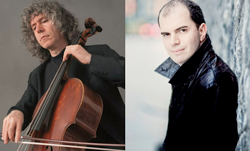By Mike Telin
As
Although the first collaboration between Isserlis and Gerstein occurred quite by accident, the artistic chemistry was evident, and from that time the two musicians have continued to perform together whenever their schedules allow. “Yes, we started playing by complete mistake,” Kirill Gerstein says, “but it soon grew into an important and good musical friendship.”
Kirill Gerstein studied piano at a special music school for gifted children and in addition to studying classical music, he also taught himself to play jazz by listening to his parents’ record collection. After the renowned vibraphonist Gary Burton, who was performing at a music festival in the Soviet Union, heard Gerstein, he invited the 14-year-old to study jazz piano as the youngest student ever to attend Boston’s Berklee College of Music. Following his second summer at Tanglewood, Gerstein turned his focus to classical music and attended the Manhattan School of Music, where he studied with Solomon Mikowsky.
Kirill
I spoke to Kirill Gerstein by telephone from Germany where he had performed a solo recital earlier that evening.
Mike Telin: This is a wonderful program you’re planning for Cleveland; did you choose it together?
Kirill Gerstein: Steven is such a good programmer, and in the past we have basically played whatever pieces he chooses, and he chooses very well. But in this case, I have wanted to play the two Brahms sonatas for quite some time, and he liked the idea. The e-minor was actually on that first program we played together in Germany. But the F-major sonata — obviously he’s played it many times, and I have played it quite a few times with other cellists but we have never played it together, so I am looking forward to that. Then all of the smaller pieces sort of naturally grew out from there. We’re playing quite an early piece by Busoni so it’s not necessarily the most forward looking, visionary Busoni that I love, but I adore the piece, and am fascinated by it.
All of the smaller pieces, Bartók, Busoni and the Liszt, are all by great pianist composers. Then there is the whole Austro-Hungarian connection between Brahms, Bartók and certainly Liszt. So the program grew around the two Brahms sonatas, but then there are so many connections between the other composers, and I like when programs grow in this sort of harmonious way.
MT: How did you and Steven first start collaborating?
KG: It’s a funny story because we started playing together by mistake.
MT: Really!
KG: About nine or ten years ago I received a telephone call from Schloss Elmau, a luxury resort in Germany that also presents recitals asking if I would like to play some concerts with Steven Isserlis. Of course he was somebody that I knew is a wonderful cellist, so I said sure. They asked me what I would like to play and I told them that I have such respect for his playing that whatever he wants would be fine. So the program was chosen and I appeared on the agreed day. When I met him for dinner, it was a bit odd because he was a little frozen. But when we began to rehearse things got a little livelier, and we had a very nice time playing the concert.
He invited me to play more, and after several years we were in London to give a concert at the Proms. We also taped an interview for the BBC radio and they asked your same question, and Steve said it was completely by mistake. He told the interviewer that the summer before we played our first concert he was at the Verbier Festival in Switzerland, and he had met a very nice young person named Kirill who was blond and very friendly, so when Schloss Elmau asked him if he wanted to play with Kirill Gerstien, he said oh, that’s the boy I met at Verbier, so he said yes. So when I appeared obviously I was a completely different Kirill. It turns out that the Kirill he had met was a violinist, and of course looks very different then I do. So that was the reason he was frozen because when I appeared I wasn’t anybody that he knew.
MT: That is a very funny story!
KG: Yes, and aside from him being so nice I have also learned most of the cello repertoire from playing with him.
There is also a very personal story because through him I met a friend who introduced me to my wife. And so there are very nice and personal connections that have risen out of this initial musical friendship that initially started by mistake. But in this case it was a nice mistake.
MT: Although I’m sure you get tired of taking to people about this, if you don’t mind, I have a quick question about your jazz playing?
KG: Well, when the questions repeat, I try to vary the answer so it doesn’t become a routine.
MT: In a WGBH Interview you said that your jazz related activities are healthy for your classical playing. Why is that?
KG: Well I think it is because of the process and the experience of making music in a more spontaneous way. Although I think it is very important to underline that jazz also has, in some ways, quite rigid and very clear rules and laws. Obviously there is something spontaneous and on the spur of the moment about playing jazz that is very healthy for a classical musician [who is always] playing other people’s notes.
I think there is something about the sense of timing that is expected in jazz that is also part of the tradition of classical music playing but one that sometimes can get lost. And then there is the harmonic sense of jazz. So for a very long time my inner feelings have been that the two are much closer to each other then one is commonly led to believe. And, I think doing a bit of both just illustrates that more to me.
I have always found it very productive, and I guess the reason that I might have also said something about it being healthy is this: it’s very easy to delve further and further into the importance of each note and each marking that we see in the score of Beethoven or Brahms that we can eventually be overwhelmed. So sometimes it’s very refreshing to not have to play the notes that somebody else prescribed for you but the notes that you seemingly choose at that moment.
And I think there is something refreshing about feeling closer to the spirit of how Brahms, Liszt or whoever felt as they were composing, because all these written down masterworks come out of human impulses, so for me, I do think it’s important to feel that perspective.
Click here for a printable version of this article.



